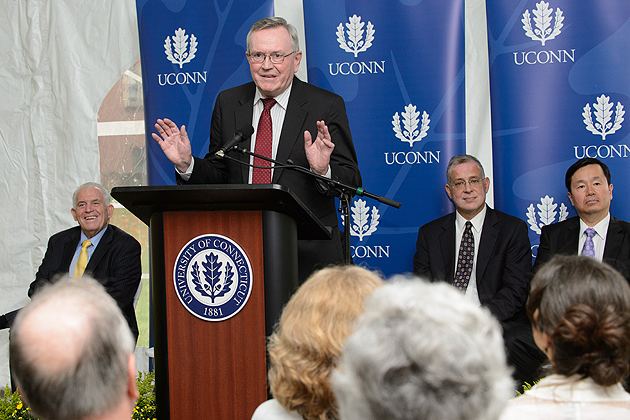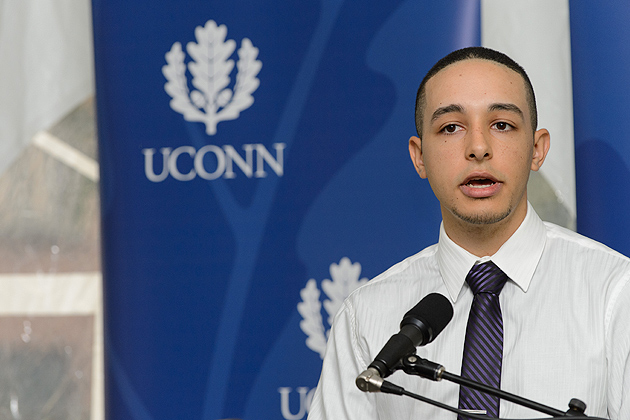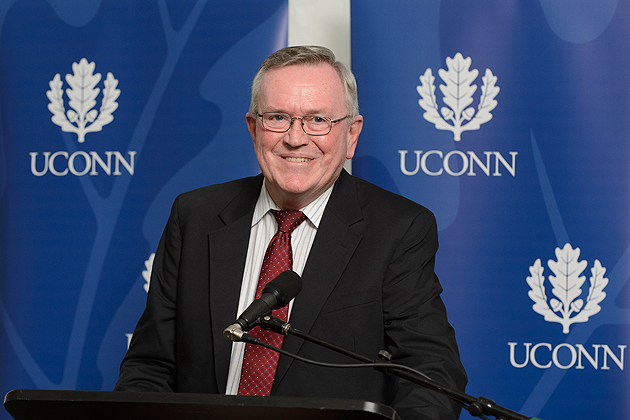
University leaders, including UConn President Susan Herbst, Interim Provost Mun Choi, and numerous Board of Trustees members, along with a crowd of past and present members of the University community, were among those gathered in Storrs on Wednesday at a ceremony celebrating the official designation of the Philip E. Austin Building.
Formerly known as the College of Liberal Arts and Sciences (CLAS) Building, the Philip E. Austin Building honors the leadership of former UConn President Philip Austin, who served as President from October 1996 to September 2007, during which time the University experienced a physical transformation and strengthened its reputation for academic excellence. Austin oversaw the $1 billion UConn 2000 renovation program, and led the start of the $1.3 billion 21st Century UConn program that followed.
“After 11 years of being President – and then another one as Interim President – the University was better by every measure than it had been before,” Herbst said during the event. “Phil Austin helped UConn to become what we are today: one of the best universities in the nation.”
Chairman of the Board of Trustees Lawrence McHugh also thanked Austin for his years of leadership, and for his guidance in driving the transformative UConn 2000 and 21st Century UConn programs, calling him one of the key figures in the life of the University.
“People come and go at universities,” McHugh said. “But there are some individuals, some leaders, who make such an impact in the time that they are there that they change the course of that institution. For UConn, Phil is one of those people.”

Honors student Carl D’Oleo-Lundgren ’14 (CLAS), a double major in political science and international relations, offered personal thanks to Austin, whom he had met this past spring as a donor. An endowment established by Austin funded an intensive Arabic language program in which D’Oleo-Lundgren took part over the summer.
“I am just one of the many students who have benefited from Dr. Austin’s support,” D’Oleo-Lundgren said. “Many of you know Dr. Austin as an educator and a leader, as a colleague and as a President. But to me, he is much, much more. When I leave UConn, wherever I go, and whatever good I help bring to this world, part of that will always be owed to him.”
Austin addressed the crowd as well, speaking in part about the rewarding experience of leading a land-grant university. “We have a responsibility to do research that helps all people throughout the state certainly, but beyond,” he said. “The idea is to take the many fruits of a place like this and ensure that everyone benefits from the investment.”
He also acknowledged the support of Board members, legislative leaders, and his own office staff, as well as senior administrative staff. “No one does anything like this alone,” he said. “They kept the place going.”
Dean Jeremy Teitelbaum of the College of Liberal Arts and Sciences and Interim Provost Mun Choi gave brief remarks at the event as well.
The UConn Board of Trustees voted in July to name the CLAS Building in Austin’s honor. The building, which features numerous classrooms, lecture halls, and faculty and administrative offices, was renovated in 2001 from the former Waring Chemistry Building into the home of the University’s largest College.
Following his tenure as President, Austin served on the University faculty, as interim president from May 2010 to June 2011, and later as interim vice president for health affairs at the UConn Health Center. He also has participated in accreditation and other activities of the New England Association of Schools and Colleges and the National Collegiate Athletic Association on behalf of the University.



